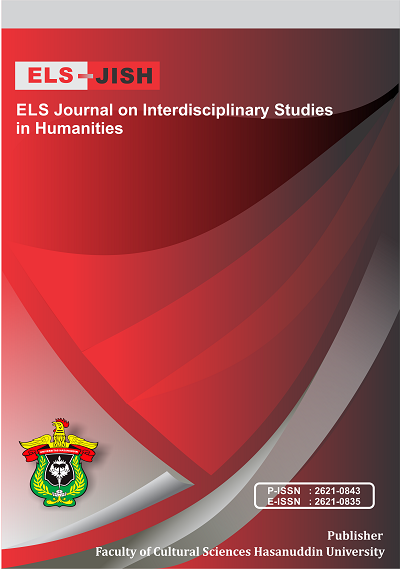Death of Hero in Othello (1603) and Romeo and Juliet (1595): Death and Dying Studies in English Literature
DOI:
https://doi.org/10.34050/elsjish.v6i3.29605Keywords:
Death and Dying, Othello, Romeo and Juliet, Shakespeare, TragedyAbstract
This research focuses on the hero's death in two Shakespearean plays, Othello and Romeo and Juliet. It attempts to answer how the author depicts death and dying in Shakespeare's plays. Benstock and Dickinson, two specialists on death and dying, will provide an answer to the challenge. Benstock divides the death stages into three categories: deceased, moribund, and living-dead. Simultaneously, Dickinson mentions three periods of life: children strove (early life), gazing grain (physical maturity), and setting sun (ageing). This qualitative research uses textual analysis by deeply reading to describe the heroes’ deaths in the plays. The conclusion was that the hero's death is simply a Shakespearean device for revealing the truth about anything. The message of peace is Romeo and Juliet's death as a vehicle for unifying two opposing families, as in Romeo and Juliet's tragedies between Capulet and Montague. It explains why there should be death when peace can be easily achieved. Furthermore, the revelation of truth through death confirms Desdemona's loyalty to Othello.Downloads
References
Bennett, R. V. (1974). Death and the Curriculum. Chicago: American Education Research Association.
Benstock, B. (1969). “The Dead” in James Joyce Dubliners: Critical Essay (C. Hart, ed.). New York: Faber and Faber Copyright.
Bradley, A. C. (1937). Shakespearean Tragedy, Lectures on Hamlet, Othello, King Lear, Macbeth (Second Edi). London: Macmillan and Co. Limited.
Bradley, A. C. (2018). Shakespearean tragedy. Bloomsbury Publishing.
Callaghan, D.M. (2003). Health-promoting self-care behaviors, self-care self-efficacy, and self-care agency. Nursing Science Quarterly, 16(3), 247-254.
Ćirović, M. (2021). Conceptual metaphor in Shakespeare's tragedies, comedies, and tragicomedies as a means towards better understanding of the plays, characters, the author, and the Renaissance period. Универзитет у Београду.
Faruk. (2012). Metode Penelitian Sastra. Yogyakarta: Pustaka Pelajar.
Gamboa, B. (2018). Shakespeare's Double Plays: Dramatic Economy on the Early Modern Stage. Cambridge University Press.
Kristiana, V. (2022). Psychoanalysis of "Desdemona" Character on Othello. PHILOLOGY: Journal of English Language and Literature, 2(1).
Krueger, G. (2004). “Death Be Not Proud: Children, Families and Cancer in Postwar America, Bulletin of the History of Medicine 78. Baltimore. Maryland: Johns Hopkins University Press.
Shakespeare, W. (1595). Romeo and Juliet. London: Oxford University Press.
Shakespeare, W. (1603). Othello. London: Oxford University Press.
Downloads
Published
How to Cite
Issue
Section
License
Copyright (c) 2023 Ramis Rauf, Fardan Rezkiawan Faida, Afriani Ulya, Mutmainnah, Eko Harianto

This work is licensed under a Creative Commons Attribution-ShareAlike 4.0 International License.

















